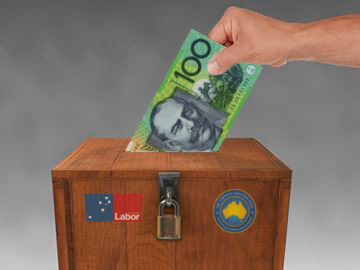Disclosures show cost of favour
 The latest AEC election donation data shows the cost of influence-peddling at the federal and state levels.
The latest AEC election donation data shows the cost of influence-peddling at the federal and state levels.
The AEC’s Transparency Register has been updated, providing access to detailed donation information in various formats.
The new data shows that in 2019-20, state and federal Labor collectively reported brought in over $55 million, but the Liberal parties managed just over $59 million. The Greens reported $19 million and The Nationals $12 million.
But the bulk of the money came from only a small slice of society, with analysis by the Centre for Public Integrity showing 46 per cent of 2019-20 donations coming from just 5 donors.
Visy magnate Anthony Pratt’s investment firm Pratt Holdings donated $1.3 million across the Liberal Party’s national and Victorian divisions and $250,000 to the Nationals.
Woodside Energy was the most generous of the resources companies, spending $335,415 across the three biggest parties; $110,000 each to Labor and the Liberals and $55,000 to the Nationals. Gina Rinehart’s Hancock Prospecting provided $37,000 to the Liberal Party.
The Australian Hotels Association funded political parties for more than $425,000 between its federal, NSW and South Australian branches.
Financial services giant Macquarie Group split its spending of $251,230 between the ALP and Liberal Party.
The big four consulting firms found significant funds, with PwC giving $165,711 to the Liberals and ALP; EY giving $72,372; Deloitte donating $94,962 to the Liberal Party, Labor and the Nationals, and KPMG funding Labor and the Liberal Party $152,094 together.
Crown Resorts hedged its bets both ways, putting $184,566 on the three big parties together.
ANZ spent $100,000 across Labor and the Liberals, Westpac split $96,000, NAB donated $95,000, split between the three big parties, while Commonwealth Bank donated $151,675 across all three.
Pfizer – the company behind the first COVID-19 vaccine set to be used in Australia – found $47,140 for the three major parties, while Johnson & Johnson donated $35,000 to Labor and $27,500 to the Liberals.
Tobacco giant Philip Morris coughed up $55,000 to the National Party.
Businessperson Clive Palmer was once again Australia’s biggest political donor, spending $5.9 million on bankrolling his United Australia Party ahead of the Queensland state election. The bid failed spectacularly, with his donations dwarfed by $83 million spent on an election campaign that delivered just 0.6 per cent of the vote.
Centre for Public Integrity director Joo Cheong Tham said Australia’s political donations disclosure scheme is mis-named.
“It is a non-disclosure scheme with more than a third of political funding shrouded in secrecy,” he said.
“The absence of caps on political donations has permitted a handful of donors to dominate the funding of political parties. That the most significant level of government has the weakest political finance laws is a grave weakness of Australian democracy.”
Opposition Leader Anthony Albanese said the figures show; “We have a problem with confidence in the political system in this country. We need a national integrity commission”.
A National Audit Office (ANAO) report last year found management of the election donation disclosure scheme by the Electoral Commissioner (AEC) was only “partially effective”.
The auditors said the AEC appeared reluctant to penalise parties for late returns or errors, but the electoral office disputed that claim.








 Print
Print